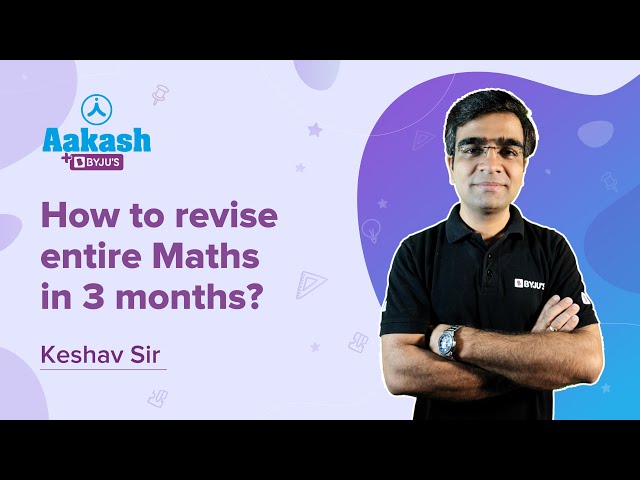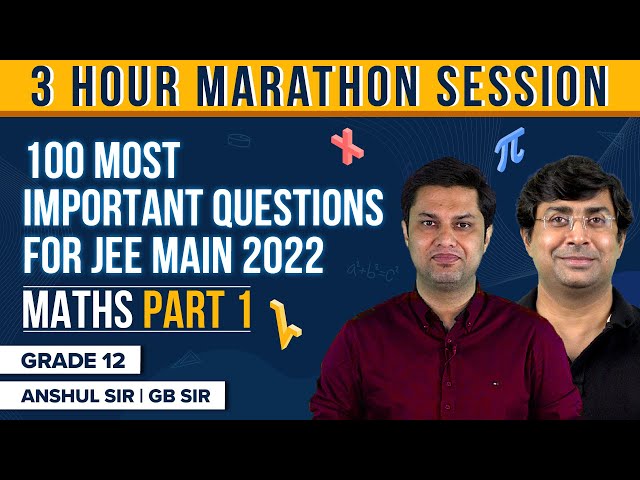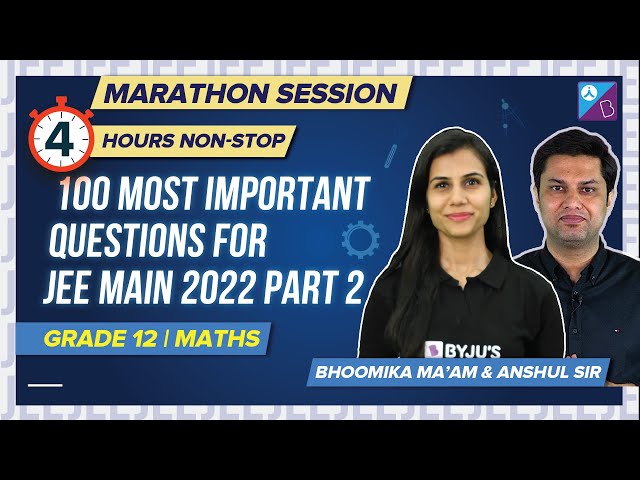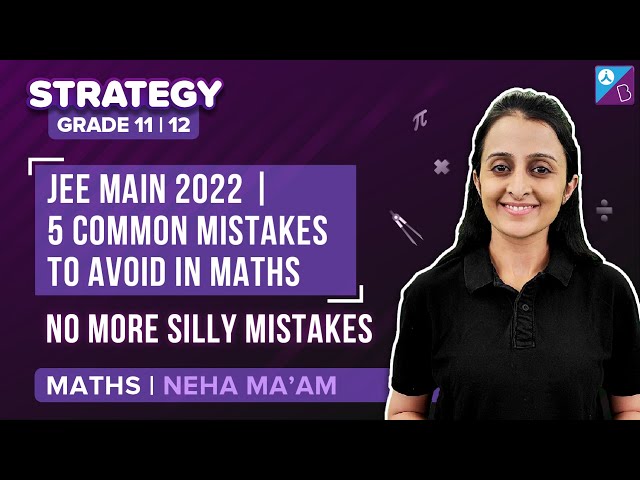When preparing for highly competitive exams like JEE Main, Mathematics is one of the most important subjects an applicant has to deal with. We can go on to say that Math forms an extremely important part of our civilization. Although Math, Chemistry, and Physics all have the same weightage in the examination, Mathematics holds an edge over others as it is the deciding factor at the end. The foundation of Physics and Chemistry is created by mathematics. Almost all the numerical problems of Physics and Chemistry make use of topics such as quadratic equations, differential equations, and calculus.
The IIT JEE Maths Syllabus is an ideal mix of difficult and easy topics. Some of the topics are easy to crack in the examination like permutations and combinations, quadratic equations, trigonometry, probability, straight lines and circles in coordinate geometry and differential calculus. Hard work and practice is the only way to crack the JEE examination. We live in an era of MCQ’s (Multiple Choice Questions) and those days are long gone when students used to spend several minutes cracking one problem. The MCQ format does not only test the applicant’s knowledge base but also their aptitude.
The most important thing while tackling a competitive examination is having clear basics. A lot of math books are present that explain all the necessary concepts in detail and promise to hold the most difficult form of questions that might come in the examination, but what matters is how the basics are comprehended. Given below are some of the important topics from where most of the questions in JEE Main are generally asked.
Last 3 Months Strategy to Score 99+ Percentile in Maths – JEE Mains 2023

JEE Maths Last 3 Months Revision and Preparation Tips Video

Important Topics For JEE Math Section
So let’s start topic wise and discuss what they can contribute to an applicant’s attempts to crack the IIT JEE examination:
1. Algebra: No other topic can come close to Algebra in the simplicity and ability to shell out easily obtainable marks in the JEE Examination. What is required from the applicants is to have high computational speed and clarity about their basic concepts? Algebra is also considered as one of the most interesting topics and thus clarity of concepts plus good calculation speed is enough to score outstanding marks from this topic. Some of the major areas that an applicant should cover in algebra are as follows:
- Differential Equations
- Probability
- Complex Numbers
- Permutation and Combination
- Quadratic Equations and Expressions
- Matrices and Determinants
- Progressions and Series
- Binomial Theorem
- Sets, Relations, and Functions
2. Calculus: It is among the largest section of modern mathematics and is considered as one of the key topics for IIT JEE preparation, Calculus has two main sections. Differential and Integral Calculus, associated with the fundamental theory of calculus. It deals with studying operations and applying them to equation solving. Problems that have their base in theory as well as problems that have their base in application show equal appearance in JEE Maths section.
Differential Calculus:
- Limits and Continuity
- Application of Derivatives
- Differentiation
Integral Calculus:
- Indefinite Integral
- Definite Integral
- Area under Curves
3. Coordinate Geometry:
One other necessary constituent of the math section in JEE Exams is coordinate geometry. Other entrance examinations, as well as IIT JEE, consider it as one of the most scorable subjects and if explained in the most basic sense it is the analysis of geometrical shape. This is also one of the only topics in which you can secure full marks. As it is a huge topic some of the major sections of it are:
- Straight Lines
- Parabola
- Hyperbola
- Circle
- Ellipse
Most of the math problems are frequently created using the topics of Straight lines and circles. These sections when coupled with each other contribute a lot of questions to the JEE examination and are a prerequisite to conic sections as well.
4. Trigonometry:
A crucial branch of maths in the IIT JEE exam is Trigonometry. Some of the essential areas of trigonometry are trigonometric ratios and trigonometric functions. To clear the examination, applicants should be extremely clear about their fundamentals of trigonometry as many competitive exams ask numerous questions from this topic. The sides and angles of a triangle are related and this relationship is studied under the branch of trigonometry. A lot of branches of technology and science have their bases in a trigonometric functions. The IIT JEE Trigonometry problems range from the trigonometry basics to the applications of trigonometry.
Recommended Videos
Right Strategy to Solve JEE Main Maths Paper

Super Tips to Solve JEE Mains Maths Questions Quickly

Sure Shot Topics for Mathematics – JEE Main

100 Most Important Maths JEE Main Questions – Part 1

100 Most Important Maths JEE Main Questions – Part 2

5 Common Mistakes to Avoid in JEE Maths Exam

JEE Main Maths – Top 10 Top Common Mistakes to Avoid During Final Lap

General Math Study Tips For IIT JEE
Bring a Change in Your Mindset
The first thing that you should do is develop a positive attitude towards the subject. Stop being afraid of Maths as a subject. Be confident and ready to learn new things.
Start Your Preparations Early On
You should start your preparations for JEE from an early stage. Usually, students start from the 11th standard or even earlier. During this, you through the JEE Math syllabus for JEE Advanced and JEE Main exam and understand the learning objectives of the question setters. Find out about the important topics and create a preparation strategy accordingly.
Practice Till The Concepts Become Familiar
During this stage, you can start by learning the basic concepts and then move on to more advanced ones such as hyperbola or binomial theorem. If you want to master Maths concepts you cannot do it by just reading about the concepts or steps on how to solve the problems. You should start solving problems until you fully understand the core idea of the concept. At the same time, you should manage your time properly while doing it.
Don’t Engage in Rote Learning
Memorizing concepts or rote learning should be avoided if you are dealing with Maths. This subject requires more practical and reasoning skills. It is important for you to understand the concepts clearly and also have answers for both the “How” as well as the “Why” part.
Create A Maths Dictionary
While Maths deals with a lot of formulas, have a separate notebook for them and you can write all of them in this notebook and have a look at them at a later instance. You can also make or keep a maths dictionary, flashcards that can help you to quickly and easily revise or remember the formulas and at any moment.
Alternatively, you should also focus on revising the content and important concepts thoroughly. Improve your weak areas and practise solving problems as much as you can.
These are a few effective ways in which you can enhance your math skills and study productively for the exams.
Students can score well and achieve great rankings in the examination by preparing these subjects proficiently. Every question has a short and sweet method of being solved and thus, with practice, applicants gain command over the different topics as they surf through them regularly. Brute force won’t work and thus one should figure out creative and short methods to solve problems and practice them regularly under the pressure of time. Students should practice previous years’ JEE Main question papers as it would give them an idea of how the paper is set and what amount of marks are allotted to what topic.
Related Links
| Revision Tips JEE Main and JEE Advanced |
| Prepare IIT JEE in One Year |
Rank Booster – JEE Maths

Comments